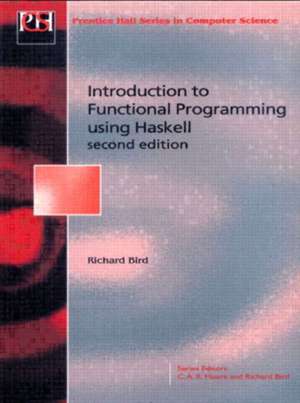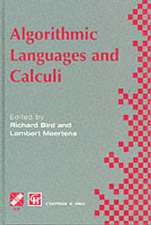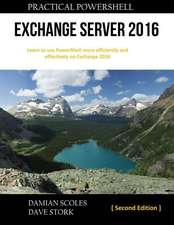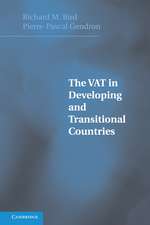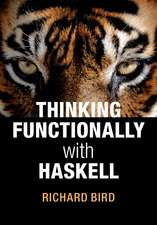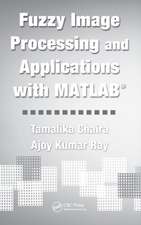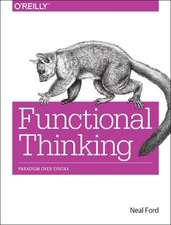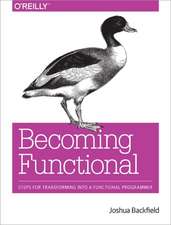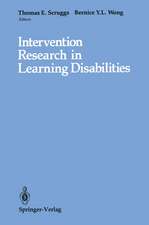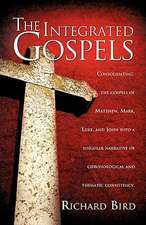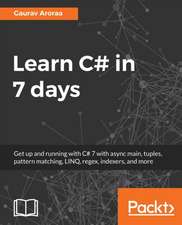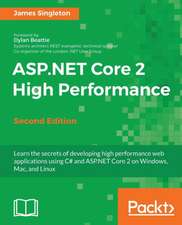Introduction Functional Programming: Prentice Hall Series in Computer Science
Autor Richard Bird, Thomas E. Scruggs, Margo A. Mastropierien Limba Engleză Paperback – 30 apr 1998
After the success of the first edition of Introduction to Functional Programming, the authors have thoroughly updated and revised this bestselling title. This book is unusual amongst books on functional programming in that it is primarily directed towards the concepts of functional programming, rather than their realization in a specific programming language. The book clearly expounds the construction of functional programs as a process of mathematical calculation, but the mathematics is restricted to that relevant to the actual construction of programs.
Preț: 474.84 lei
Preț vechi: 545.79 lei
-13% Nou
Puncte Express: 712
Preț estimativ în valută:
90.87€ • 94.15$ • 75.84£
90.87€ • 94.15$ • 75.84£
Carte disponibilă
Livrare economică 28 februarie-14 martie
Livrare express 13-19 februarie pentru 39.58 lei
Preluare comenzi: 021 569.72.76
Specificații
ISBN-13: 9780134843469
ISBN-10: 0134843460
Pagini: 448
Dimensiuni: 176 x 236 x 22 mm
Greutate: 0.75 kg
Ediția:Nouă
Editura: Prentice Hall
Seria Prentice Hall Series in Computer Science
Locul publicării:Harlow, United Kingdom
ISBN-10: 0134843460
Pagini: 448
Dimensiuni: 176 x 236 x 22 mm
Greutate: 0.75 kg
Ediția:Nouă
Editura: Prentice Hall
Seria Prentice Hall Series in Computer Science
Locul publicării:Harlow, United Kingdom
Descriere
After the success of the first edition of Introduction to Functional Programming, the authors have thoroughly updated and revised this bestselling title. This book is unusual amongst books on functional programming in that it is primarily directed towards the concepts of functional programming, rather than their realization in a specific programming language. The book clearly expounds the construction of functional programs as a process of mathematical calculation, but the mathematics is restricted to that relevant to the actual construction of programs.
Cuprins
1. Fundamental Concepts.
2. Simple Datatypes.
3. Numbers.
4. Lists.
5. Examples.
6. Trees.
7. Efficiency.
8. Abstract Datatypes.
9. Monads and Interaction.
10. Case Study.
2. Simple Datatypes.
3. Numbers.
4. Lists.
5. Examples.
6. Trees.
7. Efficiency.
8. Abstract Datatypes.
9. Monads and Interaction.
10. Case Study.
Textul de pe ultima copertă
After the success of the first edition, Introduction to Functional Programming using Haskell has been thoroughly updated and revised to provide a complete grounding in the principles and techniques of programming with functions. The second edition uses the popular language Haskell to express functional programs. There are new chapters on program optimisation, abstract datatypes in a functional setting, and programming in a monadic style. There are complete new case studies, and many new exercises. As in the first edition, there is an emphasis on the fundamental techniques for reasoning about functional programs, and for deriving them systematically from their specifications. The book is self-contained, assuming no prior knowledge of programming and is suitable as an introductory undergraduate text for first- or second-year students.
Caracteristici
- Now uses Haskell 3.1.
- All chapters have been rewritten and substantially updated
- New case studies, including a substantial application involving an automatic proof tool.
- A calculus of time complexity is included.
- The treatment of data types and recursion comes much earlier than the previous edition.
- Exercises have been changed and simplified.
- There is a new chapter on abstract datatypes in a functional setting.
- There is a simple yet coherent treatment of the Haskell class.
- The laws of functional programming have been made more coherent.
- Includes a treatment of monadic input-output.
